
The 1993 Canadian federal election was held on October 25, 1993, to elect members to the House of Commons of the 35th Parliament of Canada. Considered to be a major political realignment, it was one of the most eventful elections in Canada's history. Two new regionalist parties emerged, finishing second and third in seat count. Most notably, the election marked the worst defeat for a governing party at the federal level and among the worst ever suffered by a governing party in the Western democratic world. In a landslide, the Liberal Party, led by Jean Chrétien, won a majority government.

The 1988 Canadian federal election was held on November 21, 1988, to elect members to the House of Commons of Canada of the 34th Parliament of Canada. It was an election largely fought on a single issue: the Canada–United States Free Trade Agreement (CUSFTA); the Progressive Conservative Party campaigned in favour of it whereas the Liberal Party and the New Democratic Party (NDP) campaigned against it.

The 1867 Canadian federal election was held from August 7 to September 20, 1867, and was the first election for the new country of Canada. It was held to elect members representing electoral districts in the provinces of Nova Scotia, New Brunswick, Ontario and Quebec to the House of Commons of the 1st Canadian Parliament. The provinces of Manitoba (1870) and British Columbia (1871) were created during the term of the 1st Parliament of Canada and were not part of this election.
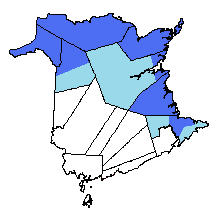
The Parti Acadien was a political party in New Brunswick, Canada in the 1970s and 1980s. The party was founded in 1972 by Acadians who were upset over poorer living conditions in predominantly francophone areas of the province versus those areas dominated by anglophones. The economy of New Brunswick was concentrated in the cities of Fredericton, Saint John and Moncton, while the eastern and northern parts of New Brunswick, predominantly Francophone, was relatively poorer as a result of an economy based primarily on entrenched and seasonal commercial fishing and lumber industries.

Richard Bennett Hatfield was a New Brunswick politician and the longest serving premier of New Brunswick from 1970 to 1987.

The Progressive Conservative Party of New Brunswick is a centre-right, conservative political party in the Canadian province of New Brunswick. The party has its origins in the pre-Canadian confederation Conservative Party that opposed the granting of responsible government to the colony. It has historically followed the Red Tory tradition. The Progressive Conservative Party currently leads the provincial government since 2018 under Premier Blaine Higgs.

The 1963 Canadian federal election was held on April 8, 1963 to elect members of the House of Commons of Canada of the 26th Parliament of Canada. It resulted in the defeat of the minority Progressive Conservative (Tory) government of Prime Minister John Diefenbaker, with the Liberals returning to power for the first time in 6 years, where they would remain for twenty of the next twenty-one years. For the Social Credit Party, despite getting their highest ever share of the vote, the party lost 6 seats compared to its high-water mark in 1962.
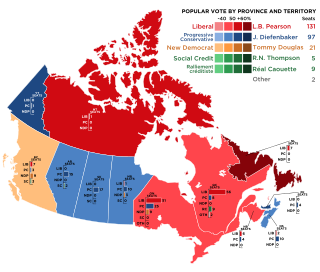
The 1965 Canadian federal election was held on November 8, 1965 to elect members of the House of Commons of Canada of the 27th Parliament of Canada. The Liberal Party of Prime Minister Lester B. Pearson was re-elected with a larger number of seats in the House. Although the Liberals lost a small share of the popular vote, they were able to win more seats, falling just short of a majority.
A safe seat is an electoral district (constituency) in a legislative body which is regarded as fully secure, for either a certain political party, or the incumbent representative personally or a combination of both. With such seats, there is very little chance of a seat changing hands because of the political leanings of the electorate in the constituency concerned and/or the popularity of the incumbent member. The opposite type of seat is a marginal seat. The phrase "tantamount to election" is often used to describe winning the dominant party's nomination for a safe seat.
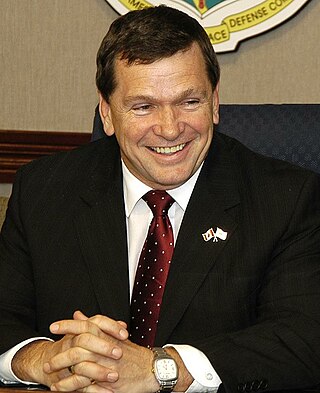
The 1991 New Brunswick general election was held on September 23, 1991, to elect 58 members to the 52nd New Brunswick Legislative Assembly, the governing house of the province of New Brunswick, Canada.

The 1982 New Brunswick general election was held on October 12, 1982, to elect 58 members to the 50th New Brunswick Legislative Assembly, the governing house of the province of New Brunswick, Canada. It saw Richard Hatfield's Progressive Conservative Party win its largest majority ever to that time.
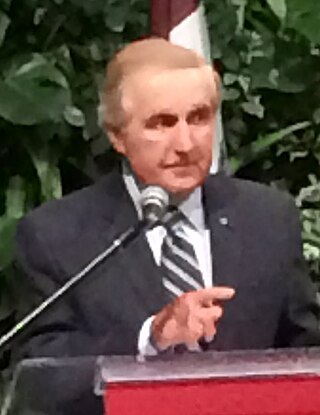
The 1991 Saskatchewan general election was held on October 21, 1991, to elect members of the Legislative Assembly of Saskatchewan.

The 1905 Alberta general election was the first general election held in the Province of Alberta, Canada, shortly after the province entered Canadian Confederation on September 1, 1905. The election was held on November 9, 1905, to elect twenty-five members to the 1st Alberta Legislative Assembly.

The 1913 Alberta general election was held in March 1913. The writ was dropped on 25 March 1913 and election day was held 17 April 1913 to elect 56 members to the 3rd Alberta Legislature. Elections in two northern districts took place on 30 July 1913 to compensate for the remote location of the riding. The method to elect members was under the First Past the Post voting system with the exception of the Edmonton district which returned two members under a plurality block vote. The election was unusual with the writ period for the general election being a very short period of 23 days.

The 2006 New Brunswick general election was held on September 18, 2006, to elect 55 members to the 56th New Brunswick Legislative Assembly, the governing house of the province of New Brunswick, Canada.
The New Brunswick Confederation of Regions Party was a political party in the Province of New Brunswick, Canada. It was the only branch of the Confederation of Regions Party of Canada to win any seats. It held official status in the Legislative Assembly between 1991 and 1995, before losing all its seats in the following election.
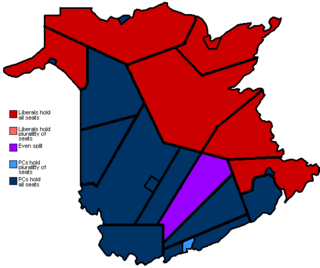
The 1970 New Brunswick general election was held on October 26, 1970, to elect 58 members to the 47th New Brunswick Legislative Assembly, the governing house of the province of New Brunswick, Canada. It saw the Liberals defeated, and a new Conservative government take over in the Canadian Province of New Brunswick.

New Brunswick has had, since the Legislative Council was abolished by an act passed on 16 April 1891, a unicameral legislature called the Legislative Assembly of New Brunswick with 49 seats. The legislature functions according to the Westminster system of government. Elections are now held at least every five years but may be called at any time by the lieutenant governor on consultation with the premier.
Joseph Zénon Daigle, is a Canadian lawyer and a former politician and Chief Justice of New Brunswick.

















